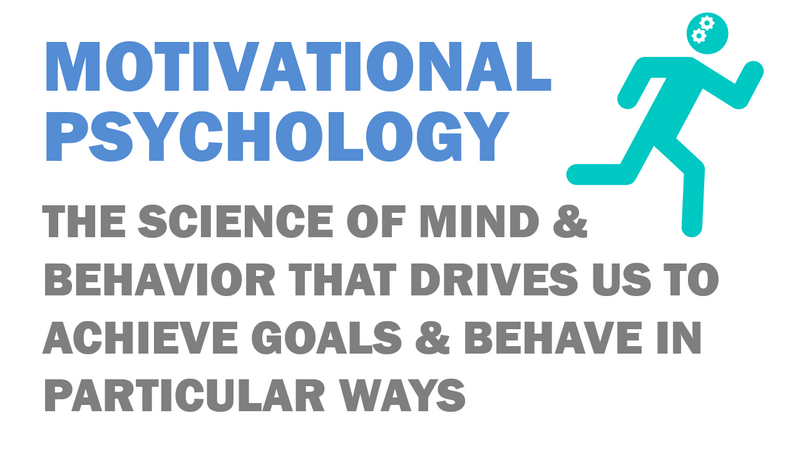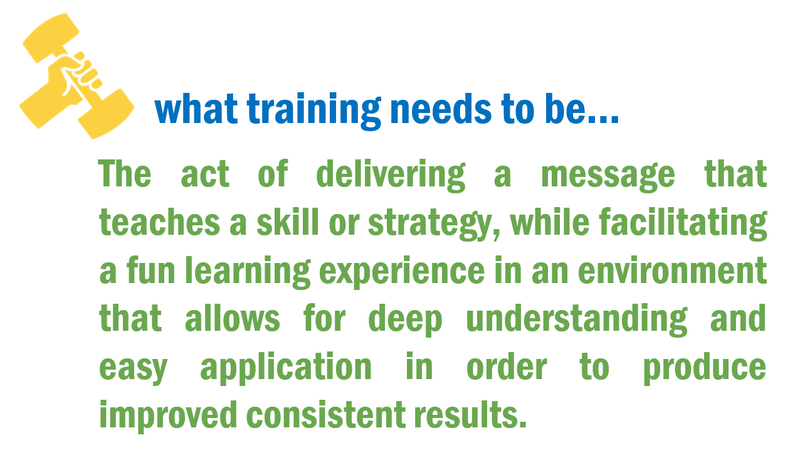ATD Blog
Motivational Psychology: A New Understanding for Training
Wed Apr 04 2018

Content
What gets you excited for the day? What keeps you going after hours? What drives business? What moves the world? What moves you? And what makes training a “want to” and not a “have to?”
What gets you excited for the day? What keeps you going after hours? What drives business? What moves the world? What moves you? And what makes training a “want to” and not a “have to?”
Content
Motivation. It’s the internal force that drives us to achieve goals. It’s the reason for behaving in a particular way. And it’s definitely not something that can be done to us. People cannot be motivated; you cannot increase someone else’s motivation, and there is no such thing as a motivational speaker.
Motivation. It’s the internal force that drives us to achieve goals. It’s the reason for behaving in a particular way. And it’s definitely not something that can be done to us. People cannot be motivated; you cannot increase someone else’s motivation, and there is no such thing as a motivational speaker.
Content
Motivation comes from within, meaning that everyone is already motivated. As executives, HR professionals, trainers, and good colleagues, it’s our responsibility to find out what motivates our people and tap into it on their terms. Why do you think that most training sessions yield results that last only a few days or maybe a few weeks (if you’re lucky)? From my work with Fortune 500 companies, small entrepreneurial startups, and public and private organizations, the answer is the same everywhere: Businesses keep trying to motivate people in ways that are not personalized.
Motivation comes from within, meaning that everyone is already motivated. As executives, HR professionals, trainers, and good colleagues, it’s our responsibility to find out what motivates our people and tap into it on their terms. Why do you think that most training sessions yield results that last only a few days or maybe a few weeks (if you’re lucky)? From my work with Fortune 500 companies, small entrepreneurial startups, and public and private organizations, the answer is the same everywhere: Businesses keep trying to motivate people in ways that are not personalized.
Content
That brings us to the second part: psychology—the science of mind and behavior for understanding and solving problems, the mental characteristics of attitude of a person or group, and the emotional factors of a situation. The best experiences are personal in nature, when we can connect with them in our own way. That’s all learning is anyhow; it’s an association between what is new and what you already know.
That brings us to the second part: psychology—the science of mind and behavior for understanding and solving problems, the mental characteristics of attitude of a person or group, and the emotional factors of a situation. The best experiences are personal in nature, when we can connect with them in our own way. That’s all learning is anyhow; it’s an association between what is new and what you already know.
Content
To understand training in the 21st century, we must tap into both the internal motivations of our people as well as the personal psychologies to make the most of the experience. That’s motivational psychology: the science of mind and behavior that drives us to achieve goals and behave in a particular way. Motivational psychology is the reason your training works or doesn’t work; it influences your organization’s culture, strategy, and capability, and it explains the deeper reason for why we do what we do.
To understand training in the 21st century, we must tap into both the internal motivations of our people as well as the personal psychologies to make the most of the experience. That’s motivational psychology: the science of mind and behavior that drives us to achieve goals and behave in a particular way. Motivational psychology is the reason your training works or doesn’t work; it influences your organization’s culture, strategy, and capability, and it explains the deeper reason for why we do what we do.

Content
Let’s backtrack for a moment. If we cannot motivate our people, what are we to do then? We inspire them! In fact, a great facilitator already knows this. We don’t teach content , we teach people . We don’t train , we facilitate an experience. Training is about teaching skills through practice over a period of time, but that isn’t enough. Facilitation is about making actions or processes possible and easier, while assisting with progress. We must be facilitators to make the learning easier and fun. Great leaders and facilitators practice the art of inspiring, the science of empowering, and the business of preparing their people to take ownership and replicate results going forward.
Let’s backtrack for a moment. If we cannot motivate our people, what are we to do then? We inspire them! In fact, a great facilitator already knows this. We don’t teach content, we teach people. We don’t train, we facilitate an experience. Training is about teaching skills through practice over a period of time, but that isn’t enough. Facilitation is about making actions or processes possible and easier, while assisting with progress. We must be facilitators to make the learning easier and fun. Great leaders and facilitators practice the art of inspiring, the science of empowering, and the business of preparing their people to take ownership and replicate results going forward.
Content
If we’re going to tap into the motivational psychology of our learners, here’s what training needs to be: the act of delivering a message that teaches a skill or strategy, while facilitating a fun learning experience in an environment that allows for deep understanding and easy application to produce improved and consistent results. Yes, that’s a mouthful, but the complete definition is necessary.
If we’re going to tap into the motivational psychology of our learners, here’s what training needs to be: the act of delivering a message that teaches a skill or strategy, while facilitating a fun learning experience in an environment that allows for deep understanding and easy application to produce improved and consistent results. Yes, that’s a mouthful, but the complete definition is necessary.

Content
The world is different now than ever before. The World Wide Web revolutionized how we connect in 1995, and the smartphone revolutionized how we connect to the web in 2007. We have global access in the palms of our hands and we are distracted and overwhelmed now more than ever. We are also learning completely differently, so we need to approach learning differently.
The world is different now than ever before. The World Wide Web revolutionized how we connect in 1995, and the smartphone revolutionized how we connect to the web in 2007. We have global access in the palms of our hands and we are distracted and overwhelmed now more than ever. We are also learning completely differently, so we need to approach learning differently.
Content
This is why we need motivational psychology. You’ve probably heard of the Golden Rule: Treat others the way you’d like them to treat you. Well, here’s a spin on it: Treat others the way they want to be treated. How do we tap into what motivates others? Connect with them. Ask them. Support them. Training isn’t about us; it’s about them . It’s about what the learning means to them. It’s about helping people achieve our organizational goals. It’s about transforming the reasons for behaving in a particular way. It’s about solving problems. That’s the meaning of motivational psychology.
This is why we need motivational psychology. You’ve probably heard of the Golden Rule: Treat others the way you’d like them to treat you. Well, here’s a spin on it: Treat others the way they want to be treated. How do we tap into what motivates others? Connect with them. Ask them. Support them. Training isn’t about us; it’s about them. It’s about what the learning means to them. It’s about helping people achieve our organizational goals. It’s about transforming the reasons for behaving in a particular way. It’s about solving problems. That’s the meaning of motivational psychology.
Content
Want to learn more? Join me at the ATD 2018 International Conference & Exposition for the session Motivational Psychology: A Unique Understanding of Learning and Development .
Want to learn more? Join me at the ATD 2018 International Conference & Exposition for the session Motivational Psychology: A Unique Understanding of Learning and Development.
